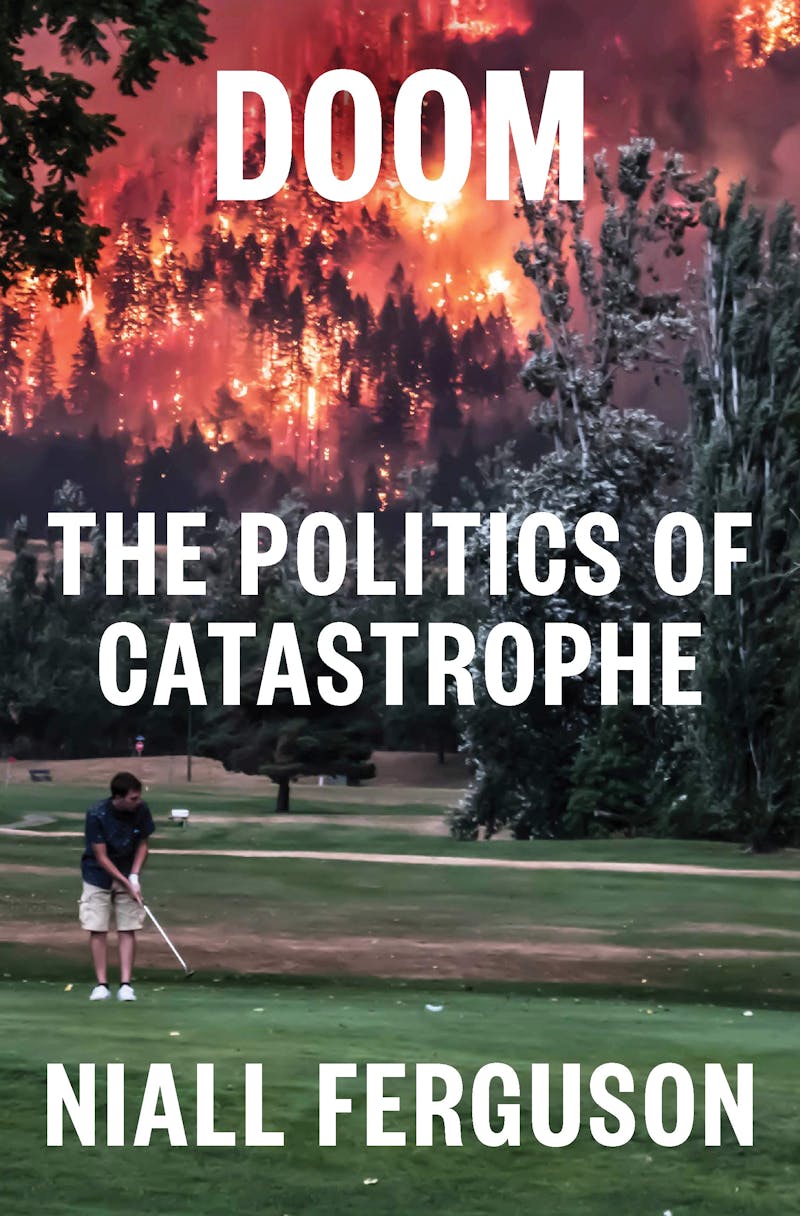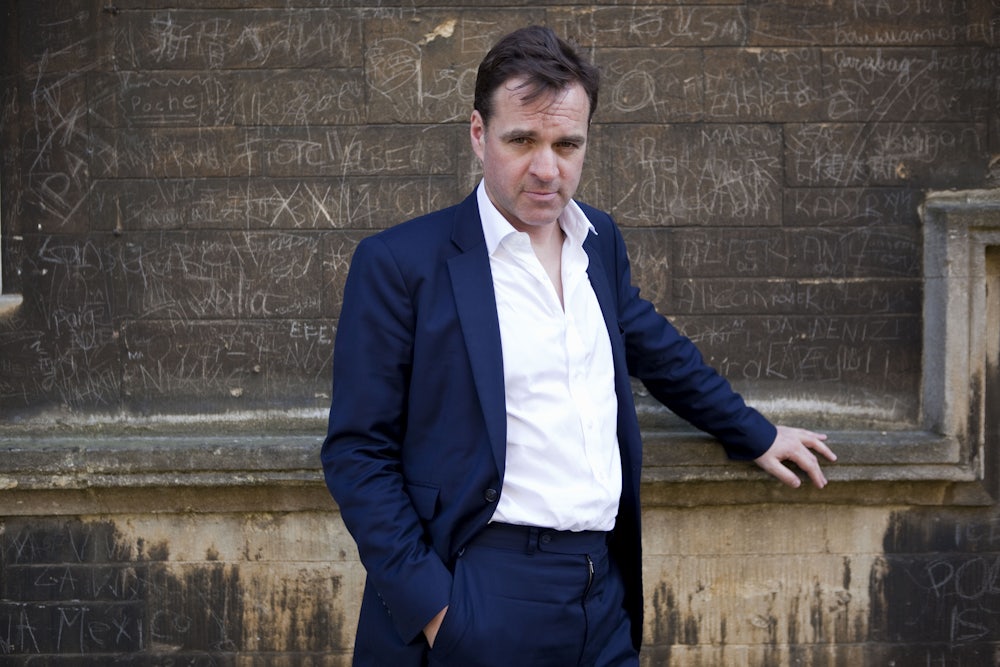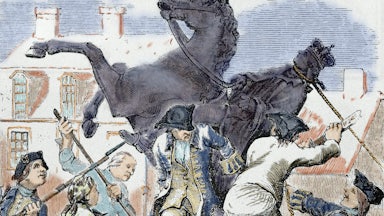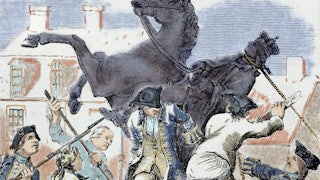In November 2006, Niall Ferguson traveled to the Bahamas. Then a professor of history at Harvard, he had been invited to address Morgan Stanley’s swank annual gathering for investors in Lyford Cay, a 1,000-acre gated community (and tax shelter) of 450 homes in the British Colonial style. Ferguson implored his audience to consider the possibility that boundless liquidity might not last forever. The crowd was “distinctly unimpressed,” he recalled. Months later, the financial system seized up precisely as Ferguson had warned.

A little more than 13 years later, history repeated itself at higher altitude. In early 2020, Ferguson—now a senior fellow at Stanford’s conservative Hoover Institution plus managing director of his own geopolitical advisory firm, Greenmantle—watched with mounting concern as reports of an infectious new respiratory disease went largely unremarked upon at Davos. His climate-obsessed fellow delegates regarded him as “eccentric” for his early attention to the novel coronavirus, he reports, making him once again the one percent Cassandra and perhaps the most well-connected man to be perennially ignored. Ferguson’s fifteenth and latest book, Doom: The Politics of Catastrophe, is meant to set the record straight on the pandemic, rebut the most “idiotic” arguments made about Covid-19, and situate our year of disastrous living in longer historical perspective. “Why,” Ferguson asks in Doom, “do some societies and states respond to catastrophe so much better than others?”
As much as a knack for provocation or his scholarly bona fides, what Ferguson has been selling for 20 years as a major public intellectual is prescience. Prescience isn’t the same thing as prediction or even wisdom, just the capacity to be the right man at the right time. In the early 2000s, Ferguson wrote books celebrating the British Empire and imploring America to use its financial muscle for benevolent imperial ends—leaving him unusually well-situated to be an influential advocate for the long-term occupation of Iraq. In 2008, when banks and states crumpled beneath the weight of over-leveraged balance sheets and the financialization of the globe became evident, Ferguson’s brand-new history of money allowed him to speak authoritatively about the “financial secret” that made the world tick. Doom trades on prescience, too. Ferguson confides that he has been “keenly interested in the role of disease in history” for over 30 years, now positioned perfectly for a pandemic.
It’s the resolutely public orientation of his writing and scholarship that has distinguished Ferguson throughout his career. Early on, he became notorious for reaching beyond his academic peers to address ordinary readers with appetites for good stories, skillfully told, to say nothing of their disposable incomes. (At 34, on the cusp of his celebrity, he was praised by The New York Times as a historian “Whose Vox Is Populi.”) Whether hosting television documentaries or writing revisionist bestsellers, Ferguson has typically pursued influence through public argument: by provoking debates and aiming to win them. This is exactly how one expects a committed liberal and Scottish Enlightenment buff to behave, treating the public sphere as the most important maker and breaker of authority.
Doom is different. Clubby
and superficial and impressively dull, it feels intended to win over the
powerful few, not persuade—or even madden—the many. Arriving at a time of
massive wealth concentration and consolidated power, Doom offers a
revealing glimpse of how ideas are sold to those with great wealth, tremendous
influence, limited curiosity, and a penchant for having their own assumptions
assiduously confirmed. More than that: to read Doom is to understand
what it looks like when a public thinker truly goes private.
Ferguson has long been fond of the explanatory power offered by the physical and social sciences, leavening his historical tomes with borrowed scientific metaphors and concepts. It’s appropriate, then, that Doom exists in a sort of wobbly quantum state: at once a book, two books, and, finally, not really a book at all.
One of the things Doom contains is a critical interpretation of the first six months or so of our most recent pandemic, focused principally on Britain and the United States. Ferguson proposes that we see Covid-19 not as a shocking “black swan” event but instead a “gray rhino,” a term coined by Michele Wucker in 2016 to describe “dangerous, obvious, and highly probable” occurrences that we should see lumbering toward us but usually don’t. We missed Covid-19, Ferguson believes, in part because policymakers were too focused on climate change, led astray by the siren call of Greta Thunberg, “child saint of the twenty-first-century millennialist movement.”
For the early spread of the virus, Ferguson blames the “obfuscation and foot-dragging” of “China’s dysfunctional one-party state” plus the World Health Organization’s “supine, if not sycophantic” Director-General Tedros Adhanom Ghebreyesus. He thinks that physical distancing, testing, contact tracing, and travel restrictions were useful but that lockdowns were a “historically unprecedented” error and a massive overreaction to a disease that did not appear to be as deadly as the Spanish flu. Like his Hoover colleague Scott Atlas, who briefly, calamitously advised the Trump administration, Ferguson says that the economic consequences of business closures “may have exceeded the public health benefits,” which he judges to have been relatively minor. (Public health experts disagree, and an important study in Nature Human Behaviour found that lockdowns were among the most effective tools for stopping the spread of Covid-19. But here we are.) For the egregious first-wave failures in Britain and America, Ferguson does not much blame Boris Johnson or Donald Trump but rather faults public health bureaucrats and scientific advisers. Ordinary people are responsible, too, he notes, for their inability to grasp the science. The real problem, Ferguson considers, betraying a fatal misunderstanding of how public health information functions, “was that Americans all over the country acted in ways that simply ignored what was known by that time about the virus and the disease.”
Ferguson acknowledges that some of Doom’s forceful judgments “may already prove to have been wrong at the time of publication.” Indeed, his interpretation was first drafted in August 2020: a world before vaccines, before variants were a major concern, before the U.S. suffered its ruinous third wave. Then, the U.S. was reporting about 50,000 cases daily; by early 2021, that count had soared by a factor of five to a quarter-million cases reported every day. Ferguson’s then-estimated American death toll (of 250,000) for 2020 was exceeded by year’s end. It now stands at more than half a million. His sense of the pandemic’s real seriousness—and his skepticism of lockdowns—hinges on the reader “assuming that the virus [would] not mutate in a way that made it more contagious or more lethal or both,” a condition one desperately wishes had turned out to be true.
There is not much to be gained by fact-checking Ferguson’s claims about Covid-19, many of which are now simply outdated. But there are two threads in his analysis worth tugging on, since they lead us to the book’s most noxious offering: polished and savvy versions of the riskiest conservative ideas about the pandemic.
The first is Ferguson’s vociferous defense of Boris Johnson and Donald Trump, two men “childishly” blamed by journalists for their Covid leadership but with whom, we are told, not much responsibility actually lies. Disasters like the 1986 Challenger explosion or the Chernobyl meltdown, Ferguson contends, indicate that structural or organizational failure is usually to blame when catastrophe occurs. He proposes that it is often a fallacy
to attribute a crucial role to a leader in a disaster, unless it is one of those leaders like Stalin, Hitler, or Mao who purposefully sets out to cause a disaster. Most disasters occur when a complex system goes critical, usually as a result of some small perturbation.… The point of failure, if it can be located at all, is more likely to be in the middle layer than at the top of the organization chart.
Instead of framing the pandemic as a “morality play” about populism, Ferguson suggests, we should focus on the bloated “administrative state,” a bureaucratic nightmare that has “produced pathologies every bit as harmful, and perhaps in the long run more so, than the virus SARS-CoV-2.” Ferguson knocks process errors like the Center for Disease Control and Prevention’s sluggish approach to testing and quality control, the failure to set clear lines of accountability for the overall response, and (in the U.K.) poor expert advice—all more salient, he writes, than even the most “manifestly idiotic” things Johnson or Trump did or didn’t do.
Yet could we imagine a counterfactual scenario (a favorite Fergusonian move) in which different behavior from these leaders might have improved the pandemic response? Yes. Any epidemiologist or public health expert will tell you that clear public communication is one of the best non-pharmaceutical interventions we have at our disposal to reduce the spread of infectious disease. If people don’t understand what they’re being asked to do or why, if rules are unclear or scientific messengers lack credibility, achieving wide uptake of key measures like mask-wearing or physical distancing will prove next to impossible. Ferguson, whose work has always been more attuned to networks and numbers than the nature of language, does concede that “good information is vital” for pandemic response, chastising internet platforms for not stanching a deluge of online disinformation. But he’s unwilling or unable to connect the dots when it comes to the role of government leaders.
Ferguson frames egregious cases of mixed or misleading health messaging—for instance, Trump’s retweeting of claims about miraculous Covid cures from an anti-mask physician who believes in demonic sexual illness, or the furore sparked when Boris Johnson adviser Dominic Cummings broke lockdown rules—as “diverting” dramas and distractions. They are much more than this. Research in The Lancet found, for example, that the Cummings debacle severely eroded public confidence in the U.K.’s pandemic response. Ferguson is not wrong to argue that leaders of complex organizations are not the singular authorities we imagine them to be. But what leaders say is entirely within their own control. And on this, the populists do have much to answer for.
It’s Ferguson’s quasi-Calvinist cultural gloss on the pandemic, however, that’s hardest to stomach—and that situates his account in somewhat unsavory company. One of the most consistent, if least persuasive, themes in Doom is the idea that some mixture of wokeness and generational leftist snowflakery has impaired our ability to deal with the coronavirus. We simply aren’t as tough as we used to be, Ferguson thinks, not as willing as Americans of generations past to confront death and accept losses. He admires President Eisenhower and the “stoical attitudes” of his fellow citizens during the Asian flu of 1957–58 (when no lockdowns were used), inviting us to compare that favorably with “the hesitancy of many voters in 2020 to … return to work and social normalcy.” He sympathetically cites Texas Lieutenant Governor Dan Patrick, who proposed that senior citizens should “take a chance on [their] survival” and resist protective measures, to save “the America that all America loves” for generations to come.
Ferguson’s fixation on sensitivity and cancel culture leads him to stake out some bizarre claims. One of the heroes of Doom is Maurice Hilleman, the scientist responsible for the rapid development of a novel flu vaccine in 1957 (as well as the inventor of several major vaccines still used today, including jabs for measles, chickenpox, and meningitis). What made Hilleman successful, Ferguson thinks, was his “fearless single-mindedness” and his rough, unsympathetic manner. He was combative, rude, profane, and celebrated his firing of employees with an office trophy collection of fake shrunken heads. Ferguson laments that it is “not easy to imagine” such a gruff male genius “thriving in the academy of the 2020s.” Setting aside the fact that jerks like Hilleman continue to thrive in the university, it’s a bit inconvenient for Ferguson that the Covid-19 vaccine was developed in record time not by a monomaniacal old-school man’s man but rather via the patient, painstaking research of a Hungarian woman and a German-Turkish husband-wife team.
Doom is a Covid-19 book. More importantly, from Ferguson’s perspective, it is also “a general history of catastrophe,” covering everything “from the geological (earthquakes) to the geopolitical (wars), from the biological (pandemics) to the technological (nuclear accidents).” Really, Doom is a lofty tour of various unfortunate events: “asteroid strikes, volcanic eruptions, extreme weather events, famines, catastrophic accidents, depressions, revolutions, wars, and genocides.” What seems to join such disparate phenomena—though Ferguson never states it so directly, preferring to assert madly that “like Tolstoy’s happy families, all disasters are fundamentally alike”—is that they are distressing occurrences in which some people die and others suffer. On that slender reed, Doom promises that there are “general lessons” to be learned “from the historical study of catastrophes” writ large.
Many of those lessons are reasonable, if not particularly original. There is no such thing as an entirely natural disaster, Ferguson rightly notes. They are all, on some level, “man-made political disasters,” drawing their significance and impact from the ways in which they interact with social systems and political cultures: from the state capacity to enforce quarantines or roll out testing kits to the housing patterns that put us at perennial risk of mudslides and earthquakes. What makes disasters significant is “whether or not there is contagion,” that is, some form of ripple effect or networked cascade. Every disaster is a “moment of truth, of revelation,” he writes, in a phrase the likes of which you have read countless times since last spring, an experience that “lays bare the societies and states that it strikes.”
Ferguson’s eight chapters on the comparative study of disasters lack the polemical force of his briefer reflections on Covid-19. One comes away having learned new random facts (the diameter of South Africa’s Vredefort Crater, it turns out, is 190 miles) but absent any serious understanding of which matter most or why. Long block quotations go unpacked and unreflected upon. Few of the book’s major conceptual claims are novel. Its typology of serious risk-events, for instance, stitches together three categories developed by others: gray rhinos (Michele Wucker), black swans (Nassim Taleb), and dragon kings (Didier Sornette). And there are paragraphs and pages, on topics like cognitive bias and network science, that are lifted nearly word-for-word from Ferguson’s earlier books and articles.
We will certainly face more major disasters in our lifetimes, whether
industrial accidents or pandemics or existential threats like climate change and
perhaps artificial intelligence. Many will ask us to reckon meaningfully with loss. Some will demand that
we reimagine how we live together. Ferguson might easily have sifted through
his vast Wunderkammer of catastrophe for cases in which societies emerged
stronger from times that tested them, to help us see “how
to build social and political structures that are at least resilient and at
best antifragile” to face future
disasters. But to write that book, Ferguson would have had to engage more generously
with the environmentalists and Green politicians who have become the most urgent voices calling
for sociopolitical resilience. He rather concludes that these “radical prophets,”
people who seek to inflict “economic penance to avert the end of the world,”
have little to teach his elite readers and boardroom acolytes.
It is the relationship of formal power and informal influence that makes the Fergusonian world go round. Unusually for a professional historian, much of his work has been made possible not by archival serendipity but by the high and mighty. His masterful account of the Rothschild banking family was born when Sir Evelyn de Rothschild told Ferguson it might be “a good way to mark the bicentenary” of the family’s arrival in England. He is now halfway into a two-volume biography of Henry Kissinger, who proposed the project himself after seeing Ferguson at a fancy party hosted by Conrad Black. In his own telling, Ferguson has never been interested in wielding power, rather in studying it: what it looks like, how it works, what it is for, how it may be lost.
Exerting influence is another matter. Ferguson is never shy about the privileged circles in which he moves: Davos, Bilderberg, Ivy League alumni groups, corporate boards, private clubs. A self-described “networks guy,” he has sought for years to shape the thinking of policymakers and elites, to bring history into conversations about power and smash open the market for expertise long cornered so confidently by economists and social scientists. Siegmund Warburg, a transatlantic financier and subject of an admiring 2010 biography by Ferguson, once observed that “influence is more important than power.” This is, by all accounts, the Fergusonian credo.
If Doom were truly meant to convince or even provoke a public, to advance an argument and reframe the contours of an important debate among democratic citizens, it would fail. It is scattered and underwhelming. Ferguson appears to be much keener on settling scores (with journalists, climate activists, socialists, China doves, critics of populist leaders, etc.) than he is on meaningfully explaining our current experience. Appropriately for its Davos genesis, Doom is essentially a slide deck whipped into a book like egg whites into a meringue: Light and airy, it crumbles to the touch. It’s hard not to read the text as a client prospectus for Greenmantle, the work not of a public intellectual but a private one.
Public intellectuals, of course, are always being shuffled to the endangered species list. In the 1950s, the historian H. Stuart Hughes wondered in Commentary if the intellectual was obsolete. Russell Jacoby’s 1987 polemic, The Last Intellectuals, decried the loss of serious public thinkers as cushy universities swallowed up bohemian avant-gardists. Thirty years later, in The Ideas Industry (2017), political scientist Daniel Drezner sketched a universe in which public intellectuals had been replaced by “for-profit thought leaders.” Ferguson cooperated with Drezner’s book, confiding in an interview that he had made the switch to thought leadership “for the money.”
Thought leadership represents the neoliberalization or corporatization of intellectual life, but it does, in principle, still maintain the pretense of shaping a conversation occurring in a public space—the way intellectual authority has been wielded and weighed really since the Enlightenment. With Doom, even that veneer has been stripped away. In this light, its oddest and most irritating qualities make more sense. The chortling disdain for socialists and climate activists, the repetition and recycling, the mystifying detours and digressions (including several pages spent patiently debunking the historical theories of a hedge-fund billionaire named Ray Dalio)—all these things turn out to be features rather than bugs, in a work meant to cajole and convince an exalted few. We have left the world of John Stuart Mill and Adam Smith and are back with Machiavelli. Here, ideas and authors matter for whispering in the king’s ear. Finding or convincing a democratic public is not necessary.
Ferguson has not held an academic position in a history department since 2015, when he left Harvard for the Hoover Institution. He confided to Drezner that he wouldn’t miss the classroom, that teaching students was “not the most efficient way to change the world.” It looks as though Ferguson may have found a better way. And he doesn’t need any of us.








